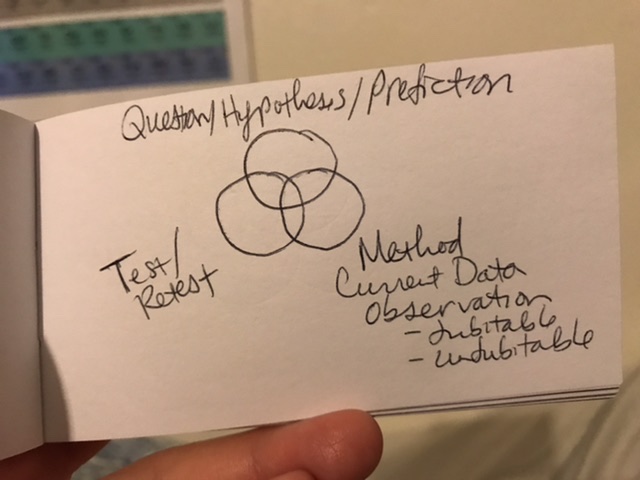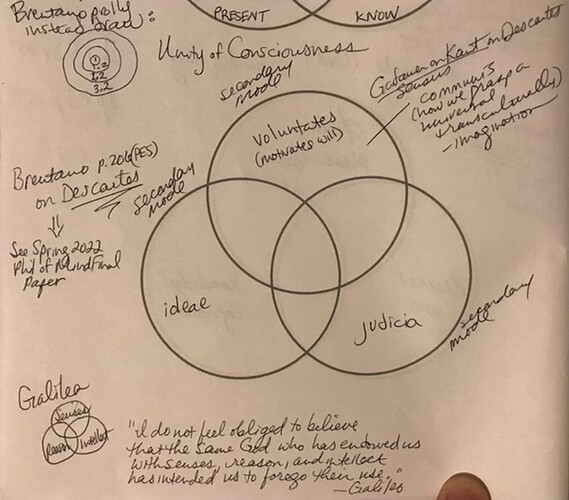Dr. Turner’s question: In “I think, therefore I am…”, Descartes presents us with four ‘precepts’ of logic that he believes will provide us with a method to arrive at secure knowledge. What are these four principles? How would you describe them in your own words? Why does Descartes claim that these principles are preferable to methods for obtaining knowledge based on traditional logic, analysis (that is, ancient geometry), and modern algebra? What do you think? Can you identify any problems with Descartes’ principles?
The four precepts are listed on page 182 in the reader:
“The first was, never to accept anything as true when I did not recognize it clearly to be so, that is to say, to carefully avoid precipitation and prejudice, and to include in my opinions nothing beyond that which should present itself so clearly and so distinctly to my mind that I might have no occasion to doubt it.
“The second was, to divide each of the difficulties which I should examine into as many portions as were possible, and as should be required for its better solution.
“The third was, to conduct my thoughts in order, by beginning with the simplest objects, and those most easy to know, so as to mount little by little, as if by steps, to the most complex knowledge, and even assuming an order among those which do not naturally precede one another.
“And the last was, to make everywhere enumerations so complete, and surveys so wide, that I should be sure of omitting nothing.”
In my own words, the four principles are:
-
Start fresh, forget everything you learned, and only allow onto the drawing board or starting point that which is obviously and indubitably true.
-
Whenever a question or doubt arises (in other words, further support or investigation is needed–it is dubitable or falsifiable), dissect it into its smallest parts and subject each part to examination.
-
Do not make a further inference until every premise in the argument chain that grounds/precedes it is sound or (in the case of the starting point premises) indubitable.
-
Make sure you haven’t forgotten to examine any of the parts dissected at the second step, and make sure that the second step is not missing a part that would result in making different inferences. OR: Make sure that such examinations of each part are taking into account ALL data that would influence an inference about each part. To me, this is just the second principle elaborated upon.
Descartes thinks these principles are more useful than traditional means because a) logic only tells you if the argument form is correct, b) similarly, math (geometry, algebra, et cetera) does not necessarily point to anything in reality, although it can tell you how it would operate if it DID exist. They are the rules/boundaries of reasoning and physical/natural reality, so they are actually important structurally (bones), but do not give actual substance (meat). I cannot off the top of my head argue with this beyond just stating that the fourth principle is just the second principle in more detail. It would only take a small bit of tweaking to turn this into the scientific method cycle that also acknowledges indubitable truths (so we aren’t just conducting experiments in The Matrix, ha). If my intuitions are correct, that is. I’m going to eat lunch and then attempt it below…
Observation (step 1: separate the dubitable from the indubitable)
Question/Hypothesis/Prediction (step 2: fully lay out what needs to be examined)
Test the question/hypothesis/prediction (step 3)
Iterate (step 4)
Disclaimer: The second image is included because it shows that Kant got his three syntheses from prior people who had also arrived at the same thing so maybe he arrived independently or they all did & are part of a tradition of awesome (cuz it goes back all the way to Plato/Moses…so “back” may be the wrong word)? But, since Kant referred to Descartes, I highly doubt he was unaware, and also Brentano mentions both Kant & Descartes in his work (second Venn).
The two Venns are aligned. Up top is the reason for inquiry, or the Why? Descartes’ ideae is Kant’s ideas (reverse that, or go up). Take it from there. It’s so silly that all three spheres can have all three words in them depending on the sense of the word… kinda like nature & other words that suffer a lot of equivocation: reason, judgment, so forth.
The focus here is returning to Descartes & really listening, rather than just accepting others’ interpretations… Do the same with Kant & every other philosopher. Piss your teachers/pastors off when necessary.

